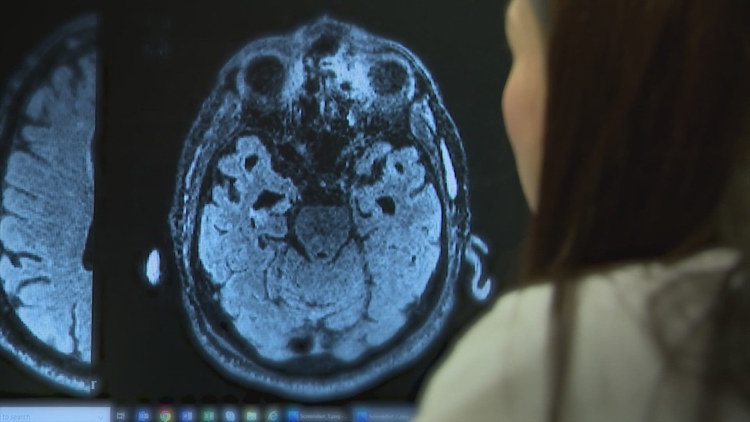Science
Texas Voters Face Crucial Decision on $3 Billion Dementia Research Fund

The upcoming vote on Proposition 14 has the potential to significantly transform dementia research in Texas. If approved in the general election on November 5, 2024, this measure would allocate $3 billion towards groundbreaking research initiatives aimed at combating Alzheimer’s disease and other forms of dementia.
Proposition 14 seeks to establish a dedicated funding stream for Texas researchers, potentially leading to innovative treatments and improved care for millions affected by these conditions. Currently, dementia and Alzheimer’s impact over 400,000 residents in Texas, a number projected to rise sharply in the coming years as the population ages.
Investment in Research and Innovation
The proposed funding would be directed primarily to research institutions, including the Texas Medical Center, the University of Texas, and the Baylor College of Medicine. Proponents argue that this investment could spur significant advancements in understanding and treating dementia, reshaping how the state addresses these growing health challenges.
Supporters of Proposition 14 emphasize that the funding could facilitate collaborations between universities and research facilities, leading to faster discovery and implementation of new therapies. Dr. Thomas C. Gibbons, a leading neurologist at Texas Health and Human Services, stated, “This initiative represents a beacon of hope for families affected by dementia. With adequate funding, we can accelerate our research efforts.”
Opponents, however, raise concerns about the long-term financial implications of such a large commitment. Critics argue that the state should explore alternative funding mechanisms that could provide more immediate benefits without the burden of long-term debt.
Public Sentiment and Stakes Involved
As the election date approaches, public sentiment appears to be mixed. Advocacy groups for both dementia patients and their families are mobilizing support, highlighting personal stories that illustrate the urgency of the issue. According to a recent survey conducted by the Texas Health Institute, approximately 65% of respondents expressed support for increased funding for dementia research, citing the critical need for breakthroughs.
The stakes are particularly high for Texas, where the population of seniors is growing rapidly. By 2030, it is estimated that the number of Texans aged 65 and older will exceed 4 million, significantly increasing the prevalence of dementia-related conditions.
As voters weigh the implications of Proposition 14, the outcome could redefine the future of dementia research in Texas and beyond. If passed, the initiative not only promises to enhance the state’s research capabilities but also aims to bring hope to countless families navigating the challenges of dementia.
In conclusion, as Texans prepare to cast their votes, the decision on Proposition 14 will have lasting effects on the state’s approach to dementia and Alzheimer’s research. The potential for discovery and innovation stands at a critical juncture, highlighting the importance of informed voting in shaping the future of healthcare in Texas.
-

 Science2 weeks ago
Science2 weeks agoResearchers Challenge 200-Year-Old Physics Principle with Atomic Engines
-

 Politics2 weeks ago
Politics2 weeks agoNHP Foundation Secures Land for 158 Affordable Apartments in Denver
-

 World5 days ago
World5 days agoBoeing’s Aircraft Production: Assessing Numbers and Challenges
-

 Entertainment4 days ago
Entertainment4 days agoSyracuse Stage Delivers Lively Adaptation of ‘The 39 Steps’
-

 Health2 weeks ago
Health2 weeks agoNeuroscientist Advocates for Flag Football Until Age 14
-

 Lifestyle2 weeks ago
Lifestyle2 weeks agoLongtime Friends Face Heartbreak After Loss and Isolation
-

 Lifestyle4 days ago
Lifestyle4 days agoTrump’s Push to Censor National Parks Faces Growing Backlash
-

 World2 weeks ago
World2 weeks agoGlobal Military Spending: Air Forces Ranked by Budget and Capability
-

 Lifestyle5 days ago
Lifestyle5 days agoRed Bluff High School’s Elli Nolan Named Rotary Student of the Month
-

 Science5 days ago
Science5 days agoAI Misidentifies Doritos Bag as Gun, Triggers Police Response
-

 Business2 weeks ago
Business2 weeks agoSpirit Airlines Cuts Workforce with Furloughs for 365 Pilots
-

 Top Stories5 days ago
Top Stories5 days agoUrgent Search for Suspect Who Exposed Himself to Teen Girl








